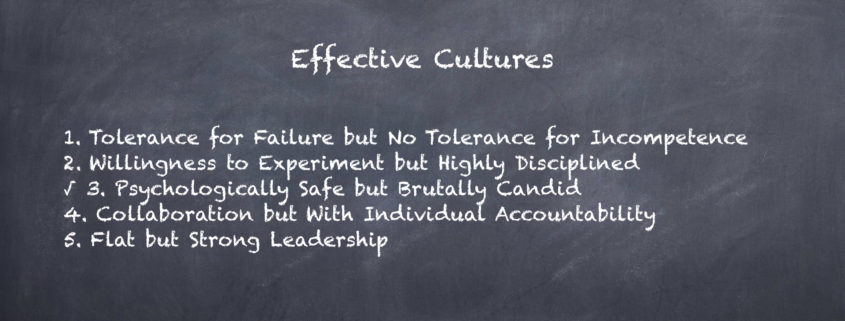A Word About Culture: Part Three
This is the third post in a series inspired by a Harvard Business Review article, “The Hard Truth About Innovative Cultures”, that posited these five characteristics of effective corporate cultures:
- Tolerance for Failure but No Tolerance for Incompetence
- Willingness to Experiment but Highly Disciplined
- Psychologically Safe but Brutally Candid
- Collaboration but with Individual Accountability
- Flat but Strong Leadership.
Last time out, we presented our take on experimentation, uncertainty, ambiguity, and the necessity of discipline. This time, we examine the nature of psychologically safe, brutally candid environments.
Smile When You Say That
By the strictest terms of the article’s point #3, we’re not sure our organization qualifies as psychologically safe or brutally candid. Here are those terms:
Psychologically safe environments … help organizations avoid catastrophic errors [and] support learning and innovation … candor is critical to innovation because it is the the means by which ideas evolve and improve … [people] must be willing (and able) to constructively critique others’ ideas without being abrasive … providing and accepting frank criticism is one of the hallmarks of respect.
We do encourage open, honest, and thorough exchanges of ideas and opinions, knowing our people are competent, willing to take risks, and highly disciplined. But we expect respect and its reciprocation to be precursors to any such exchanges. If all of us in the organization don’t have respect for each other first, it’s not likely to be earned (or back-filled) by providing and accepting frank criticism. Put another way, we engage in frank criticism at Finys because we respect each other.
Two-Way Streets
By the same token, we expect open, honest, and thorough feedback from our customers. Both parties are more rewardingly served when our customers tell us what we need to hear, rather than telling us what they think we want to hear. We try to create environments for them in which they’re comfortable providing that kind of feedback, in which they realize their greatest opportunity is helping us help them. And we take the time to know them, to respect and appreciate their needs, before the word, contract, ever gets mentioned.
Whether we’re talking about employees or customers, if the respect is mutual going in, we all win.





Leave a Reply
Want to join the discussion?Feel free to contribute!